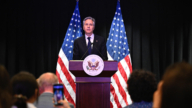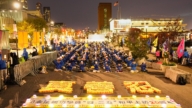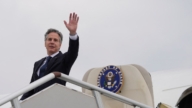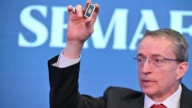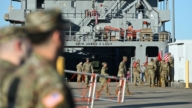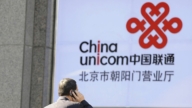【新唐人2011年10月27日訊】中共國務院10月24號將《關於加強反恐怖工作有關問題的決定(草案)》,提交人大常委會審議。這份備受爭議的草案引起法律界和眾多網民強烈批評。海內外專家指出,這項立法的反恐定義範圍擴大化,成為中共借反恐為名打壓維權和異議人士的工具。
中共的《反恐決定》把恐怖活動定義為:「以製造社會恐慌、脅迫國家機關或者國際組織為目地,採取暴力、破壞、恐嚇或者其他手段,造成或者意圖造成人員傷亡、重大財產損失、公共設施損壞、社會秩序混亂等嚴重社會危害的行為。」
根據這份草案的界定,「煽動、資助或者以其他方式協助實施上述活動的,也屬於恐怖活動。」
北京知名律師、憲政學者韓一村接受記者採訪指出,對恐怖活動這樣的定義難以得到公眾的接受。
韓一村:「我們不能認同,首先它定義範圍擴大化了,恐怖活動、恐怖組織應當是一種以暴力為手段,反社會、反人類為目地,給社會大眾造成恐懼,危害到公共利益的行為,但它不包括反政府、反國家機關。人民有反政府、反對執政黨的權力。」
在新浪微博、騰訊微博和網易、天涯論壇上,數以千計的網民對反恐新法規發表評論,其中多數人持批評或質疑的態度。
一位網民說,「針對平民的才算是恐怖活動,針對黨政機關和軍隊的算戰鬥人員,應當受日內瓦公約的保護。」另一位網民說,「是不是恐怖份子,難道由反恐機關的領導說了算?」
安徽省檢察院前檢查官瀋良慶表示,中共違反國際公認的對恐怖活動的定義。
瀋良慶:「如果是針對政府,特別是軍警的,那是一種戰爭行為,那不能算恐怖,哪怕是非和平的手段,就包括一些暴力手段,那是戰爭行為,是有組織的暴力反叛。恐怖組織和恐怖活動最主要的是指,它針對的是無辜的平民,把平民作為屠殺對像。」
草案還確立,國家反恐工作領導機構負責認定恐怖活動、恐怖組織和人員,由公安部公布名單,並立即凍結相關組織或人員的資金。
北京憲政學者陳永苗指出,最近出臺的一系列立法都是共產黨主導的,以執政維穩為目地,並不能代表民意。
陳永苗:「當前例如說刑訟法的修訂,或者身份證法的修訂,朝警察國家發展的方向還是比較明顯的。這反恐怖法案會擴大化,像反右運動那樣擴大化,把異議人士、維權人士當作反恐怖的對像,加以處置。中國的反恐是為了掌握國家權力,為了共產黨它自己掌握國家權力。」
近來,卡扎菲等獨裁政權紛紛垮臺,也有分析認為中共推出反恐立法是在防範。
流亡海外的民主人士魏京生表示,這個法案其實是針對新疆、西藏等少數民族、訪民、維權人士和所有的異議人士和團體。
魏京生:「他們就是想借反恐為名,然後在國際上好像說的過去那樣,合法的鎮壓反對派。在這方面,其實美國政府早已經多次警告他們,不得以反恐為名去鎮壓異議運動。但是中共還是要這麼做,因為這有很大的欺騙性。」
也有評論指出,這個草案是把江澤民打壓法輪功的招數「名譽上搞臭、經濟上截斷」,擴大到打壓民間維權和異議人士。
瀋良慶:「它一方面口頭上喊著反恐,實際上它這種行為本身就是國家恐怖主義行為。也是因為當時民間甚至包括異議人士對迫害法輪功表現的有些無動於衷,這也導致後來它就更加有恃無恐了,逐漸的把鎮壓法輪功的一些非常殘酷的恐怖手段,用到對付上訪維權人士,最後擴展到對付異議。」
瀋良慶援引馬丁•尼莫拉牧師的墓誌銘表示,當獨裁專制政權迫害異議人士和團體,你不站出來說話,有一天這種迫害也會擴大到自己身上。
新唐人記者常春、李元翰、黎安安採訪報導。
CCP』s Anti-terror Law, “A Good Cover-Up Tool”
On October 24, Chinese Communist Party (CCP) submitted
a draft of “Resolution For Enhancing Anti-terrorist Efforts.”
This resolution has been widely criticized
by legal professionals and netizens.
Experts point out, this resolution expands the terrorism』
definition and is a tool for eliminating social conflicts and public grievances under the name of terrorist activities.
The terrorist activity is defined in this draft as “behavior aimed
at generating social panic, intimidating state agencies or international organizations,
which has caused or intended to result in casualties,
major economic losses, damage to public property or social disorder through violence, destruction, threats or other means.”
The draft also states, “stirring up, funding or assisting
these activities are also considered terrorist activities.”
Renowned Beijing lawyer and political scholar Han Yicun
pointed out that for the general public the State Council’s definition of terrorism would be very hard to accept.
Han Yicun, “We don’t agree with it (the resolution).
First of all, it expands the definition of terrorism.
Terrorist』 activities and organizations should be only those,
using violent means, that are anti-social, anti-humane, create terror for the society, and endanger public interests.
It does not include the government itself
and government』s agencies.
Citizens have the legal right to stand up
against a government or a ruling party.”
On the Sina and Tencent microblogs, and on Wangyi
and Tianya forums, thousands of netizens questioned or criticized the new anti-terrorism resolution.
A netizen wrote, “Terrorist activities refer to only those,
targeting civilians.
Activities targeting government agency and the military
should be protected under the Geneva Conventions.”
Another netizen wrote, “Are the officials
in the anti-terror agencies to decide who is a terrorist?”
Former Persecutor from Anhui province Shen Liangqing
believes the CCP’s definition of terrorism violates the internationally
accepted definition.
Shen Liangqing, “Targeting government or military are
acts of war not terrorism, even if they used violent means.
Those are acts of war, an organized armed rebellion.
The point of terrorist organizations and activities
is to target innocent civilians, murdering civilians.”
The draft also states, officials in the anti-terrorism agencies
decide what is a terrorist activity and who is a terrorist.
Then the police department will release the list of names
and freeze bank accounts associated with such individuals.
Beijing Political Scholar Chen Yongmiao points out,
that the recent resolutions are all led by the CCP.
Their goal is to maintain stability and CCP』s rule,
and they do not represent the public will.
Chen Yongmiao, “The recent changes in the criminal』 and
the ID cards』 law are obviously for a country ruled by police.
This expansion of the anti-terror law is like the Anti-Rightist
movement, treating dissidents and human rights activists as terrorist and then eliminate them.
CCP’s anti-terrorism is to mainland its ruling power,
for the benefit of the CCP to maintain control of the country.”
Gaddafi』 and other dictators』 recent falls made some wonder
if CCP regime』s anti-terrorism measures aren』t for protection.
Overseas Chinese democracy activist Wei Jingsheng thinks,
this resolution targets Xinjiang, Tibet, petitioners, rights activists and all other dissidents』 organizations.
Wei Jingsheng, “They are using the cover of anti-terrorism,
a term that is somewhat accepted internationally, to legalize the persecution of dissidents.
The US government has warned them many times before
to not suppress dissidents under the name of anti-terrorism.
The CCP still wants to do this
because it’s a good cover-up tool.”
Experts also pointed out, this resolution could be another of
Jiang Zemin’s methods to persecute Falun Gong, expanding the crack down on civilian activists and dissidents.
Shen Liangqing, “On one side it’s yelling anti-terrorism,
but in reality this is a state committing terrorist activity.
The civilian dissidents initially acted cold
toward the persecution of Falun Gong.
Thus CCP became more confident and started to employ
more cruel methods on Falun Gong and human rights activists.
Eventually this expanded to include political dissidents.”
Shen paraphrased Pastor Martin Niemoller words, that when
a dictatorship persecutes dissidents』 groups and you don’t speak out, the persecution will expand to you one day.
NTD reporters Chang Chun, Li Yuanhan and Li Anan


